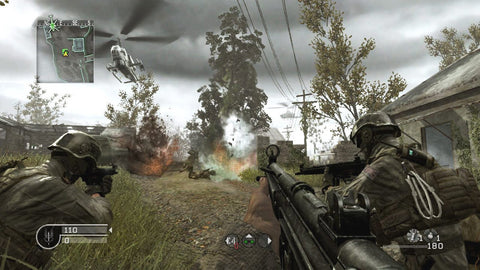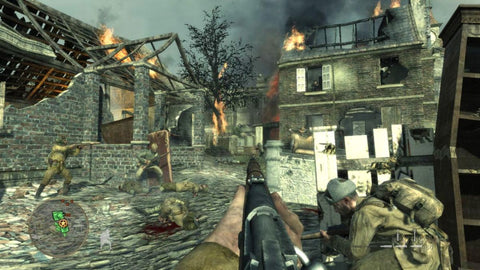The Call of Duty series has a long and storied history. Spawning 18 main games and a huge number of spin-offs, mobile versions, and handheld titles, it’s the one series that regularly prints money for super-publisher Activision Blizzard.
Below we take a quick look at each of the main Call of Duty games in order, including their performance in terms of score and sales.
Call of Duty (2003)

The series’s long journey began nearly two decades ago with the very first game titled Call of Duty. Set during World War II, the game was seemingly destined to be a rival to Medal of Honor, which was a dominant force in the space. During its initial launch, it sold nearly a million copies worldwide, particularly on PC where it also received a Metacritic score of 91, one of the highest the series has ever had.
Call of Duty 2 (2005)
Following in the footsteps of its predecessor, Call of Duty 2 continued being a big hit, particularly on the Xbox 360 where it initially launched. With over 200,000 copies and glowing praise stating it was “the best WWII shooter” at the time, this sequel single-handedly cemented CoD and its developer, Infinity Ward, as big players in the FPS market.
Call of Duty 3 (2006)
With Activision clearly seeing the potential for the series, they formulated a plan to release a new Call of Duty game annually. Through an interchanging of development hands, Call of Duty 3 was given to Treyarch to carry forward. Though the game did fairly well on all key platforms, critics had mixed opinions about its Nintendo Wii version.
Call of Duty 4: Modern Warfare (2007)

Seeing a dwindling appetite for WWII shooters, Activision tasked the next development studio, Sledgehammer, with shifting gears for the CoD series. Call of Duty 4: Modern Warfare was the first in the series to make the leap to a modern setting, complete with advanced weaponry and a perk system. MW had great reception from players, racking up some of the highest Metacritic scores in the series’s history.
Call of Duty: World at War (2008)

Despite seemingly moving away from World War combat, Activision still wasn’t ready to fully abandon Call of Duty’s roots. Call of Duty: World at War was Treyarch’s next project in the series, bringing it all back to the place where it all began, World War II. It scored decently for CoD standards and was the second fastest selling game in the US when it launched in 2008.
Call of Duty: Modern Warfare 2 (2009)
After a brief return to fighting Nazis, CoD players were returned to the modern-day battlefield with Call of Duty: Modern Warfare 2. After 4 years since the last CoD game they developed, Infinity Ward was given another crack at the series, resulting in yet another golden notch on their belts. MW2 scored 94 on both console releases and sold over 4.2 million units on the Xbox 360.
Call of Duty: Black Ops (2010)

For its return back to Treyarch’s care, 2010’s CoD went a little bit backward in time with a setting in the 1960s. Call of Duty: Black Ops was the first time the series strayed a bit further away from all-out war scenarios and into the more covert. Despite the PC version launching in a poor state, critics and players alike considered it a solid entry in the CoD series with sales mirroring MW2’s in terms of numbers.
Call of Duty: Modern Warfare 3 (2011)
Recognizing the success of the modern setting, Activision once again tasked Infinity Ward, in collaboration with Sledgehammer, to make yet another MW game. Call of Duty: Modern Warfare 3 brought back everything that made the MW series great and dialed it up to 11. The result was yet again one of the best-selling FPSs of its time, even though Metacritic scores began showing tiny signs of CoD fatigue.
Call of Duty: Black Ops II (2012)
Although some signs were there, Call of Duty: Black Ops II was the first game in the series to distinctly show where Activision’s platform allegiances lay. Handled, once again, by Treyarch, the game was still a big success, selling incredibly well on consoles. However, players noted significant issues with the PC version of the game, resulting in the series’s first sub-80 Metacritic score on the platform.
Call of Duty: Ghosts (2013)
2013 was a turning point for the CoD series. With Activision seemingly concerned players were getting tired of the same settings and gameplay, they decided to take a radical shift with the Infinity Ward-developed Call of Duty: Ghosts. Due to sweeping changes to multiplayer and a divisive story campaign, the game was the first CoD title to be slapped with sub-80 Metacritic scores across the board and sold significantly fewer units than Black Ops II.
Call of Duty: Advanced Warfare (2014)

With an eye to steer the CoD series into a fresh new direction, Activision passed the baton to Sledgehammer to develop an entry set in the future. With a setting in 2054, Call of Duty: Advanced Warfare attempted to make combat feel more futuristic by equipping players with exoskeletons that allowed for class-specific maneuvers and abilities. For the most part, the move paid off with praises sung for the bold new direction. However, sales took a tumble by 27% of those yielded by Ghosts.
Call of Duty: Black Ops III (2015)
Righting the wrongs is never easy, especially when you’re Activision trying to keep an annualized series relevant. Treyarch’s Black Ops III was a solid attempt at pulling back the series to what players loved while also making it feel fresh and fun. Its newly introduced thruster packs gave players momentum-based mobility options while keeping the shooting mechanics in lockstep with past CoD iterations. The game managed to recover the series’s sales slump a bit but was still showing signs that the devs were still favoring consoles.
Call of Duty: Infinite Warfare (2016)
At this point, it becomes clear that Infinity Ward was the innovator among the three CoD developers, and that shows with Call of Duty: Infinite Warfare. Set in an even more distant future, the radical new take on the series attempted to take the shooting all the way into space. Unfortunately, this didn’t land well with hardcore players who dislike-bombed the announcement trailer, citing that it looked “too futuristic”. The game ended up posting sales 50% lower than those of Black Ops III.
Call of Duty: WWII (2017)
They say when things are looking bleak, return to your roots and Activision did right by itself and CoD fans by doing exactly that. Sledgehammer’s Call of Duty: WWII was not just a return to the place where the series began, but also placed heavy emphasis on “boots-on-the-ground gameplay”. Despite being criticized for excluding Nazi symbolism in a large portion of the game, WWII ended up grossing over $1 billion worldwide and was one of the best-selling games in the NA region.
Call of Duty: Black Ops 4 (2018)
Treyarch’s Call of Duty: Black Ops 4 may be the biggest example of a controversial move gone right in gaming history. The game’s marketing came out swinging with a reveal that there would be no campaign in Black Ops 4, sending many fans into a tizzy. Despite that, the game sold incredibly well and returned the series to over 80 scores on Metacritic across the board. The success is generally owed to the revised Zombies experience, the addition of the Blackout battle royale mode, and multiplayer chock full of features and modes.
Call of Duty: Modern Warfare (2019)
When in doubt, remake. That’s certainly what Activision believed when they decided to take one of the best-selling CoD games and reimagine it for a new gaming generation. The gamble paid off as Call of Duty: Modern Warfare (2019) became the highest-grossing game in the series on gen 8 consoles. At the same time, the company released the highly successful battle royale spin-off, Warzone, which included mechanics that rewarded players who also bought the main game.
Call of Duty: Black Ops Cold War (2020)

Treyarch and Raven Software’s Black Ops Cold War is the first CoD game to release on gen 9 consoles, a fact that was cause for confusion for PS5 users and the way the game handled versioning. Despite that, the game sold relatively well, though its Metacritic scores were below 80. One of the key points of praise was the number of options the game had on offer for different types of players.
Call of Duty: Vanguard (2021)
Activision’s most recent attempt of bringing back the series to its WWII roots proved to be a big disappointment for many but the critics. Call of Duty: Vanguard failed to meet the company’s sales expectations, placing the blame on “lack of innovation” and a return to the WWII setting. According to players, though, the campaign was distinctly short, multiplayer lacked options, and the game, overall, felt like it was attempting to cater to a completely different audience.
Call of Duty: MWII

Modern Warfare 2 launch is right around the corner. The title is set to release on October 28th, but gaming influencers were already invite to a first-hand experience of this new revolutionary game from Activision's belt. Who is also excited about it?

SHARE
FB
LI
TW